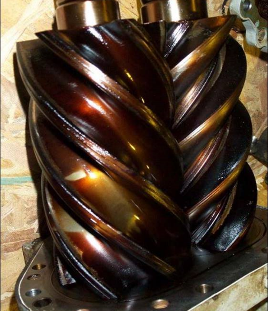
Air compressor lubricants (oil) are the lifeblood of an oil flooded rotary screw air compressor. With such a crucial role in the operation of an air compressor, it’s important to understand what compressor lubricants do and how they do it. Lubricants help lubricate bearings, create a film which causes an airtight seal for the rotors, and dissipate and control heat caused by heat of compression.
There are four important features when selecting a lubricant:
Any lubricant using a hydrocarbon base compound will create varnishing on your rotors. All the components of the lubricant are liquid at ambient temperature, but when they are heated to higher temperatures, some of components can become solids. This causes them to plate out on metal parts and act as an insulator, which reduces the ability to remove heat. This problem will exasperate as temperatures become higher.

Higher temperatures will shorten the life of the lubricants. Every 18°F above 200°F reduces the lubricant’s life by 50%. To determine the lifespan of your lubricant, follow this simple equation:
Carryover is especially important because this will increase the amount of lubricant needed to top off the compressor to keep it properly lubricated. Often overlooked are the issues with increased downstream compressed air filter element changes; lubricants getting into highly sensitive process equipment; and disposal of contaminated condensate.
Good compatibility is needed when selecting a lubricant because the lubricant may not be compatible with hoses, gaskets, water separators and any downstream equipment. Often failures will occur, but the root of the problem cannot be traced back to the lubricant. Once the lubricant has contaminated the air stream, it is often impossible to remove, which causes a great deal of monetary expenditures and time to correct the problem.
Without the proper lubricant, you can substantially reduce the life of your oil-flooded rotary screw air compressor. To know if the correct lubricant is being used in your air compressor, an evaluation should be conducted. A simple oil sample can determine the health of the compressor lubricant. A lubricant specialist can not only help determine the type of lubricant you need but identify any issues that have been caused by using the wrong lubricants.
Use the checkboxes to select the types of cookies you want to accept, then press the “Save Settings” button. View our Privacy Policy.